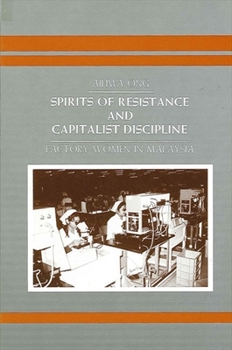Spirits of Resistance and Capitalist Discipline: Factory Women in Malaysia
Select Format
Select Condition 
Book Overview
Aihwa Ong is Professor in the Department of Anthropology, University of California, Berkeley.
Format:Paperback
Language:English
ISBN:0887063810
ISBN13:9780887063817
Release Date:January 1987
Publisher:State University of New York Press
Length:286 Pages
Weight:0.89 lbs.
Dimensions:1.0" x 6.0" x 9.0"
Customer Reviews
1 rating
Ong's work is necessary in any discussion of globalization.
Published by Thriftbooks.com User , 26 years ago
The American Dream. An ideal, the golden land, something to strive for, capitalism. For most immigrants of the early twentieth century, the "American" way of life was sought after as a better way than that found in the old country. Imagine the dilemma posed to you if that same type of capitalistic market was forced onto you, the villager of rural Malaysia, never having wanted a change in lifestyle. In her book, Spirits of Resistance and Capitalist Discipline, Aihwa Ong aims to show how the experiences of Malay women working in neoteric factories and capitalistic life culminate in spirit attacks on the factory floor. Ong succeeds in this endeavor and allows for the intellectual discussion of the possible ramifications of the development of capitalistic ventures on a global scale. Ong addresses her work to a unique group of scholars familiar with the affairs of Southeast Asia, supplementing the anthropological studies of others such as Michael Taussig. She notes, "Spirit possession episodes, in which women become violent and scream abuses, are to be deciphered not so much as a noncapitalist critique of abstract exchange values (Taussig 1980) but as a protest against the loss of autonomy/humanity in work (7-8)." Ong proves this thesis by examining the different aspects of Malay life that have been effected since British colonization: "In the specified spheres of social welfare, sexuality, and education, to name only a few, the everyday lives of village Malays are being reconstituted according to new concepts, language, and procedures (55)." Before the British introduced capitalism to Malaysia, the peasant household strove to be self-sufficient and adapted to easy relocation. While the village (kampung) still exists today, life within it has changed. Children learning English integrate words and phrases into the native Malay tongue as a symbol of their knowledge of the outside world. Marriage and dating practices have changed drastically. Ong notes of her experience in Malaysia in this arena: "Almost all factory women chose their potential spouses either directly, through correspondence, or by accepting a suitor's overtures. This autonomy was directly based on their earning power, since increasingly, village women were expected to save and contribute towards their own wedding expenses and bridal furnishings (199)." Even time spent during the day has changed with schoolgirls still being expected to contribute to household work while "boys spend most of their free time in ball games, scouting, and other extracurricular activities (94)." Given the field specific language of the above observations, the work is dominated by strong cultural text often unfamiliar to the reader. Ong is presenting the conclusions of an anthropological study, and such technical terms and references dominate the diction of the work. Nevertheless, she allows for lay readers to experience the lives of otherwise distant c






